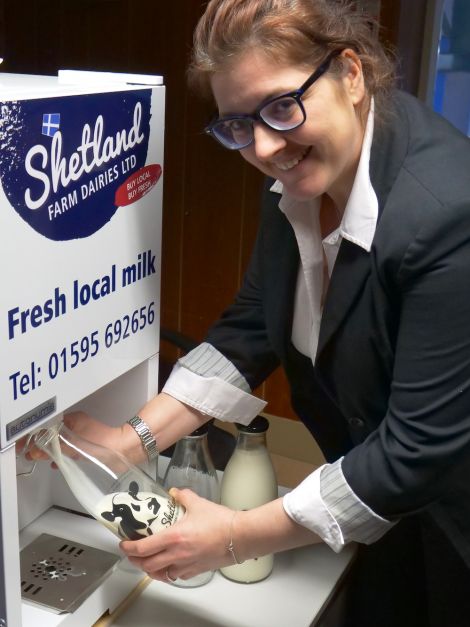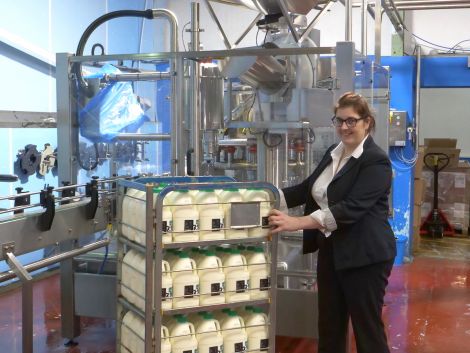Business / Glass bottles are clear way ahead for dairy
SHETLAND Farm Dairies is launching an ambitious new scheme that aims to cut down plastic waste by giving customers the chance to refill milk bottles.
The project is being trialed at two Lerwick retailers with hopes that success will see it rolled out at further outlets.
Milk for bottling will be available at Sound Service Station and Bolts Minimarket from 24 January and the dairy should have good idea of how the scheme is going by the end of February.
Manager Fiona Nicholson said that directors Robert Nicolson and Martin Burgess had each seen similar operations on visits south and compared notes before it was decided to trial it in Shetland.
She said: “It’s been a lot of work over six months to get to this stage but it’s a great idea. We will have to do a bit more work on how this will all work with the rural shops.
“We will be keen to support it being rolled out as far as we can, we just need to work out the logistics. Bolts and Sound both sell a lot of milk every day. With the peerier and more rural shops we want to maintain that quality and freshness.”
The plan attracted much “really positive” comment after BBC Radio Shetland ran a bulletin on it last Thursday.
Customers will be supplied with distinctively branded 1 litre bottles which they can get from Bolts and Sound Service Station and fill up with semi-skimmed or whole milk. They can then hand wash or machine wash the glass before returning for a refill – paying for the milk at the till as usual.
The bottles are heat-resistant printed in Yorkshire and the milk dispensers were labelled by STudio Graphic Design & Print Shop, locally.
Become a member of Shetland News
Nicholson said that she was not sure what the cost would be, as while the dairy sells milk at the same price to all the shops, it is up to the shops what they charge for it. The dairy will supply the dispensers free of charge.
Various similar ventures are taking place on the Scottish mainland and Nicholson said that they would be keeping a keen eye on these in order to develop best practice.
She said that local customer feedback would also be very welcome and key to making any tweaks to the set up.
The dairy, she said, had considered bottling the milk but this would require setting up a separate bottling plant aside from the Gremista Industrial Estate operation which presently has a daily throughput of 4,000 to 4,500 litres of milk.
Regulations mean that glass bottles must be filled in an entirely separate production line, the cost of which would be prohibitive. Delivering milk in glass bottles would also take up more vehicle space.
While the plastic containers currently used by the dairy are accepted by the council for recycling, using glass moves the business a step further on the green road, as the glass bottles can be re-used many times and recycled if necessary.
People will at least have the choice whether they re-use the bottles or put them for recycling. The response on social media showed that the environmental impact of re-using glass bottles was a big consideration.
The dispensers themselves are handy, fridge-sized units but much larger machines would be installed in the supermarkets. Discussions on this with the Co-op and Tesco are at an early stage.
The dairy has nine employees with two office staff, two drivers and five production hands. Daily production figures are 1000 two-litre bottles of semi-skimmed; 400 2l of whole milk; 600 1l of semi-skimmed; 200 1l of whole; 500 pints of semi-skimmed and 100 pints of whole milk.
A smaller 250ml bottle has recently been introduced, intended principally for NorthLink, but which is available at any shop that wants it. Nicolson described it as “ideal” for lunch packs, children and those who maybe just drink a little milk.
“We are always trying to look at ways of keeping customers happy”, she said.
Shetland Farm Dairies is supplied by about 400 milk cattle in three isles’ farms – Quendale, Setter and Noss farms.
With milk never having to travel further than 20 miles to the Gremista plant for pasteurisation and bottling, the milk is always fresh and supplied throughout the isles. Milk coming from south may be three days old before the customer buys it.
Nicholson said it was important to emphasise the hard work and challenges faced by the farms to supply the dairy. Milk, she said was a highly nutritious, natural product, essential for the healthy growth of children especially.
Become a member of Shetland News
Shetland News is asking its many readers to consider paying for membership to get additional features and services: -
- Remove non-local ads;
- Bookmark posts to read later;
- Exclusive curated weekly newsletter;
- Hide membership messages;
- Comments open for discussion.
If you appreciate what we do and feel strongly about impartial local journalism, then please become a member of Shetland News by either making a single payment, or setting up a monthly, quarterly or yearly subscription.






























































